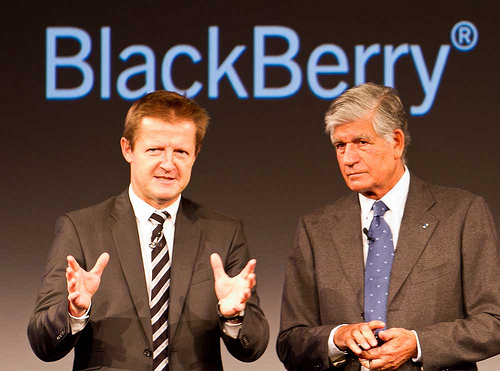By Joe Johnson (The Cascade) – Email
Print Edition: February 1, 2012
After playing Zombies vs. Humans last night on the UFV green I began to feel that maybe Blackberry maker, Research In Motion (RIM), had become very much like the undead – in the unconscious, decaying, trying to stave off death, sort of way.
At least, so it would seem – they’ve been almost totally stagnant in terms of producing anything worthwhile for the consumer. Their tablet, the Playbook, was meant to steal sales away from the iPad but only lost RIM hundreds of millions of dollars last year. Posting such poor sales numbers, they were actually forced to make deep cuts in price just to sell what they did. To add insult to injury, RIM’s ability to deliver on quality was greatly undermined when the Playbook was launched, since the operating system was woefully undeveloped and problematic.
And this wasn’t the only time RIM dropped the quality ball. Only a few months ago, a Blackberry service outage went worldwide, separating everybody from their cozy relationship with their Blackberries (nicknamed “crackberries” for a reason). This sent RIM’s already shaky customer base into a quagmire.
Given these problems, it is easy to see how RIM’s shares have dropped from a high of $148 in 2008 down to their current $16.79 value.
And it’s not like these problems are anything new. Investors have been clamoring to have Jim Balsillie and Mike Lazaridis booted from their shared position of CEO for a while, and this is exactly what has now happened (unless you take Balsillie and Lazaridis at their word that it was their decision to step down two weeks ago). Nevertheless, Thorsten Heins is now the man at the top, appointed unanimously by the board of directors.
Is Heins, who has a background in engineering and business, the man who can raise RIM from the ashes? The proof is yet to come. But I don’t want to see the company become another Nortel, providing more support to the claim that tech companies can’t exist successfully in Canada. We have a country rich in innovation and intellect, and I want RIM to be a beacon of that success.
However, in order to do that, Heins is going to have to pick the company up from the bootstraps and chip away at the monsters of the industry: Apple and Google. Apple dominates projections: it just posted its best quarter in company history, largely on the back of the iPhone and iPad, and according to some analysts is poised for even better sales in 2012. Google also continues to see its market share of tablets increase, a slice of the market pie mostly taken from Apple. By producing the Android operating system and not the hardware, Google has been able to integrate itself into many more devices to allow for that growth.
Although Google is a just another competitor for RIM, it also serves as a beacon of hope: if Google can eat away at Apple’s stranglehold on the cell phone and tablet industry, maybe RIM still has a shot to do the same. In Heins’ hands, RIM could return to dominance. Especially with a new operating system set for release in the coming months (which will drive all RIM mobile devices and be able to run Android apps) the path for return looks already set. Add a revamped Playbook 2.0 to this, and maybe RIM is a phoenix rising from the ashes after all.


